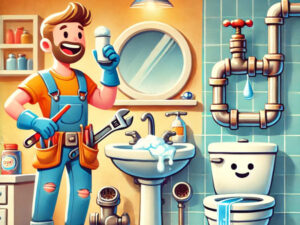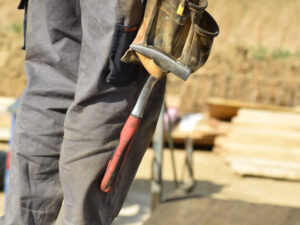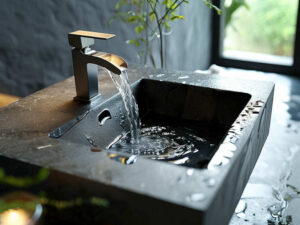When to Call a Plumber vs. DIY Plumbing Repairs

Plumbing issues are a common headache for homeowners and renters alike. While some problems are simple enough to tackle on your own, others demand the expertise of a professional plumber. Knowing when to grab a wrench and when to pick up the phone can save you time, money, and stress. Let’s break down the key questions, scenarios, and tips for deciding whether to DIY or call in a pro.
Should I Call a Plumber or Do It Myself?
The choice between DIY and hiring a plumber depends on the complexity of the issue, your tools, and your confidence level. Simple fixes like unclogging a drain or replacing a faucet washer are great for DIY enthusiasts. Bigger jobs, like installing a water heater or repairing a burst pipe, require professional expertise.
When DIY Is Okay:
- Fixing a leaky faucet
- Replacing showerheads or faucets
- Unclogging minor drain blockages
- Replacing toilet flappers or fill valves
- Cleaning or replacing aerators on taps
When to Call a Plumber:
- Burst pipes or major leaks
- Sewage backups or frequent clogs
- Low water pressure from unknown causes
- Water heater repairs or installations
- Bathroom or kitchen remodels involving plumbing
Side Note: When Should You Not Plunge a Toilet?
Plunging a toilet is often a first go-to for clogs, but it’s not always the best choice. Avoid plunging in these situations:
- Hard Objects in the Toilet: If you know a toy, toothbrush, or other solid object is stuck, plunging can push it further.
- Potential Cracks in the Bowl or Tank: Excessive force from plunging can worsen existing cracks.
- Septic Backup: If the clog is due to a septic system issue, plunging won’t help and could worsen the backup.
In these cases, it’s time to call a plumber.
Should I Call a Plumber to Replace a Toilet?
Replacing a toilet is a manageable DIY task if you have basic tools and some patience. However, call a plumber if:
- You’re unsure how to shut off the water or remove the old toilet.
- You encounter complications like uneven flooring or outdated plumbing.
- You notice leaks after installation.
What Do You Say When Calling a Plumber?
When calling a plumber, be clear and concise:
- State the Problem: Describe the issue, e.g., “I have a leak under my sink,” or “My toilet is not flushing.”
- Share Key Details: Mention how long the issue has been occurring and any temporary fixes you’ve tried.
- Ask for Availability: Find out when they can come and if there’s an emergency fee.
Should I Clean Before the Plumber Comes?
You don’t need to deep-clean your house, but clearing the area around the plumbing problem is courteous and helpful. For example:
- Clear out items from under sinks.
- Remove rugs or furniture that might block access.
- Wipe away excess water if it’s safe.
How Many Quotes Should I Get for Plumbing Work?
For major plumbing jobs, get at least three quotes to compare pricing, scope of work, and warranties. Ensure the plumber is licensed and insured. Don’t just choose the cheapest; look for fair pricing and reliable reviews.
10 DIY Plumbing Repairs and When to Call a Plumber
- Leaky Faucet: Replace the washer or O-ring. Call a plumber if the leak persists after repair.
- Running Toilet: Replace the flapper. Call a plumber if the problem involves internal tank components.
- Clogged Drain: Use a drain snake or baking soda and vinegar. Call a plumber if multiple drains clog simultaneously.
- Low Water Pressure: Clean aerators. Call a plumber if the issue affects the whole house.
- Dripping Showerhead: Tighten or replace seals. Call a plumber for valve replacement.
- Toilet Replacement: Follow DIY steps carefully. Call a plumber for leaks or floor issues.
- Garbage Disposal Jam: Reset the disposal. Call a plumber for strange noises or persistent jams.
- Frozen Pipes: Gently thaw with a hairdryer. Call a plumber for burst or severely damaged pipes.
- Water Heater Issues: Check the thermostat and flush sediment. Call a plumber for leaks or heating element issues.
- Banging Pipes: Secure loose pipes. Call a plumber for water hammer or complex rerouting.
Resources for DIYers
For those interested in tackling home plumbing repairs, here are some helpful resources:
- YouTube Channels: This Old House, PlumberParts
- Books: Black & Decker The Complete Guide to Plumbing
- Websites: Family Handyman, Home Depot DIY tutorials
- Tool Rentals: Check local hardware stores for specialized plumbing tools.
Bonus Tips – A Proactive Approach
Taking a proactive approach to plumbing care and being prepared for unexpected issues can save you a lot of stress. Here’s a closer look at these valuable tips:
1. Preventative Maintenance
Plumbing problems often start small but grow into significant issues if unnoticed or ignored. Regular maintenance can identify potential trouble spots early, reducing repair costs and preventing water damage.
- Schedule Annual Inspections: Hire a professional plumber once a year to inspect your plumbing system. They can check for leaks, assess water pressure, and ensure your fixtures and pipes are in good condition.
- Flush Your Water Heater: Sediment buildup in the water heater tank can reduce efficiency and lead to costly repairs. Flushing the tank yearly prevents these issues.
- Clean Drains Regularly: Use a safe, non-corrosive cleaner or hot water and vinegar to keep drains clear of grease, hair, and soap scum.
- Monitor for Early Signs: Keep an eye out for slow drains, dripping faucets, or unusual noises in your plumbing. Addressing these signs early can save you from major repairs later.
- Inspect Washing Machine Hoses: Replace old or cracked hoses to prevent sudden bursts or leaks.
2. Know Your Limits
DIY enthusiasm is great, but knowing when to call a plumber is equally important. Attempting repairs beyond your skill level can turn a minor issue into an expensive disaster.
- Assess the Risk: If a mistake could cause significant water damage, it’s better to call a plumber. Examples include burst pipes, installing new fixtures, or dealing with sewage issues.
- Learn as You Go: Start with small projects, like replacing a faucet aerator or toilet flapper, to build confidence and skill. Move to more challenging tasks only when you feel ready.
- Don’t Hesitate to Call for Help: Even experienced DIYers occasionally need a professional. Plumbers bring expertise, tools, and familiarity with local building codes that you may not have.
3. Emergency Kit Essentials
A well-stocked plumbing kit can help you handle minor emergencies and perform basic repairs without delay. Here are the must-have items:
- Plunger: Keep both a cup plunger (for sinks and tubs) and a flange plunger (for toilets) on hand to handle clogs.
- Pipe Wrench: This tool grips pipes securely, making it essential for tightening or loosening plumbing connections.
- Adjustable Wrench: Perfect for tasks like replacing showerheads or tightening faucet nuts.
- Plumber’s Tape (Teflon Tape): Use this to seal pipe threads and prevent leaks when installing fixtures.
- Drain Snake or Auger: Ideal for clearing stubborn clogs in sinks, tubs, or toilets.
- Bucket and Rags: A bucket is handy for catching water during repairs, while rags can quickly mop up spills.
- Flashlight or Headlamp: Plumbing problems often occur in hard-to-see places. A bright light makes it easier to work.
- Silicone Sealant: Use this to reseal joints or around fixtures to prevent leaks.
- Gloves: Protect your hands from dirty or hazardous materials.
Having these tools ready ensures you can respond quickly to common plumbing issues while avoiding unnecessary delays.
Combine for Best Results
- Combine preventative maintenance with a stocked emergency kit to tackle minor repairs on the spot.
- If your repairs hit a snag, remember the know your limits rule and don’t hesitate to call a plumber.
By adopting these strategies, you can save money, reduce stress, and keep your plumbing in excellent condition year-round. Deciding whether to DIY or call a plumber depends on the nature of the plumbing problem, your skill level, and available tools. Minor repairs like fixing a leaky faucet or unclogging a drain are perfect DIY projects. However, for major issues like sewage backups, burst pipes, or complex installations, professional plumbers are essential. Always describe the problem clearly when contacting a plumber, and get multiple quotes for larger jobs. With the right knowledge and resources, you can handle many plumbing repairs yourself while avoiding costly mistakes.







